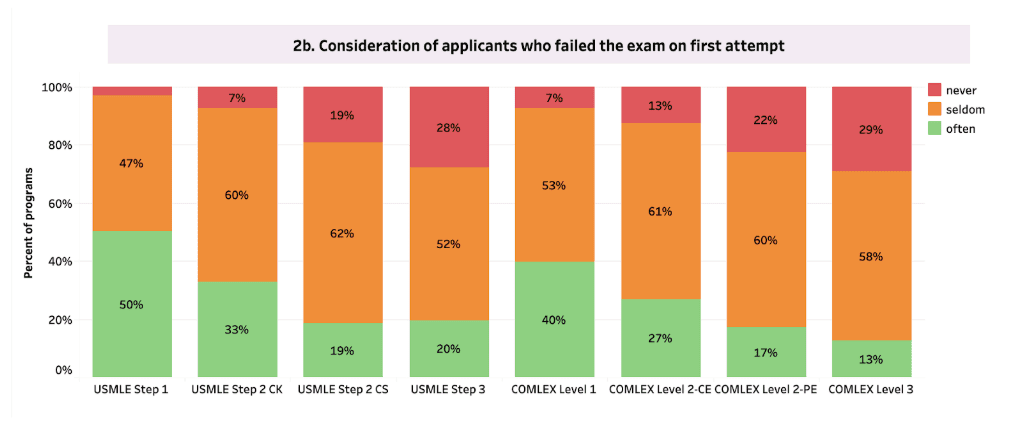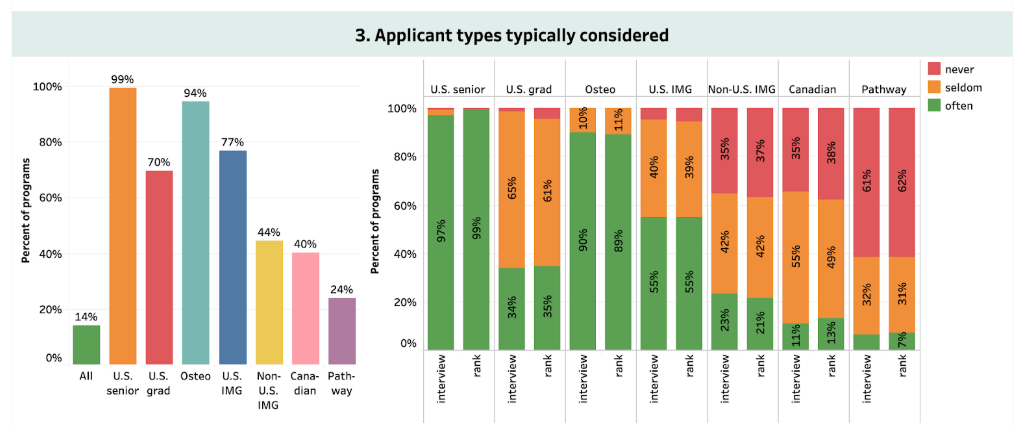What You Need to Match into Family Medicine for Residency

15846 Views
From A Program Director Viewpoint: What You Need to Match into Family Medicine Residency
The NRMP conducted a survey to determine what factors Program Directors consider when deciding which candidates to interview and rank for their residency program. The results were compiled into a “at a glance” tool, which is extremely helpful in gauging where your application packet stands compared to the applicant pool, and whether adding additional components, like a letter of recommendation (LOR) in the specialty, could give you a leg up as programs review your application.
The interactive tableau tool can be found here, and we recommend taking a look at the specialty you’ll be applying to before submitting your ERAS packet: https://public.tableau.com/profile/national.resident.matching.program#!/vizhome/PDSurvey_0/Desktoptablet
For family medicine residency, major components of the survey you should pay attention to include: (from top to bottom of the page):
- Selection Criteria for an Interview – Showing a commitment to your specialty is a major factor for family medicine. In the context of FM this doesn’t necessarily mean that you’ve only done things related to the field; they just want to know that you are truly interested in this field. Having a passing Step 1/COMLEX L1 score is also important, but note that family medicine is generally quite forgiving about scores on the low side.
- Step 1 and Step 2 Scores:
- Step 1 – Score
-
-
- 225+ looks like a very solid score in family medicine, with the median being 220.
- Range programs do NOT typically offer interviews: 200-210 seems to be the lower end of the threshold we would recommend for having a good chance at enough interviews. If you’re below 200-210 range, you should work on making other aspects of your application shine.
- Range programs DO typically offer interviews: 210-225 seems to be the range at which you can feel comfortable in being offered interviews by a decent number of programs. If you’re in the 240+ range, you can likely be selective about where you apply.
-
- Step 2CK – Score
-
-
- 200-210 seems to be the minimum threshold at which programs will grant interviews
- Scores below 200 generally will place you in a unfavorable position to receive an interview
-
- Step 2CK – Timing of Taking the Exam
- Only a slim 7% of programs required at least passing CK. You can wait to take Step 2CK until after you have submitted ERAS.
- Failing Step 1 is not likely to be a show stopper:
- Failing Step 1 is a BIG deal in ANY specialty, but family medicine is one of the best specialties for application in the context of a low Step 1 score or past failed attempts. Only 3% of family medicine programs will not consider you if you’ve failed Step 1! So, if you’ve failed an exam, just make sure other aspects of your application are presented as strongly as possible, but you should still be able to match. 47% and 60% of programs seldom consider applicants who have failed Step 1 and Step 2, respectively.
- Types of Applicants Considered:
- International Grads (U.S. and non-U.S.) should not have significant difficulty matching into family medicine: Only 5% of programs report never interviewing US IMGs. Unfortunately, 35% of programs report never interviewing non-US IMGs. Still, 55% and 23% of programs report often interviewing US and non-US grads respectively – so while there may be some programs that will be difficult to apply into from this position, there are plenty that should not present you with problems on this front.
- Osteopathic graduates should not have trouble matching into family medicine: No programs reported never ranking DO graduates. A full 90% of programs reported often interviewing DO grads, and 89% reported often ranking them. This should not be a significant barrier for you.
- Interviewees Get Ranked!: If you get an interview invitation, you are very likely to end up on the rank list if you interview. We recommend ranking at least 8-10 programs, so once you receive 10 interview invitations, you can feel okay with starting to prioritize and cancel as more come in given you are likely to get ranked.
- Expect to receive interview invitations in October: 70% of the interview invitations will be sent out in or before October. You should hear a considerable amount from family medicine programs on the earlier side, as opposed to some specialties who generally maintain radio silence for the first month or two.
- Expect the biggest block of interviews to be in December/January: 64% of family medicine interviews occur in December and January, although there is a modestly long tail on either end; this gives you ample time to prepare. For further discussion on how to prep for your interview, see our blog post on How to Crush your Residency Interview.
After you’ve browsed your specialty, take a look at a few other specialties and note what’s NOT important for family medicine residency:
- Having a strong step 1 score isn’t particularly important for family medicine
- Class ranking/quartile isn’t as important in family medicine as in other specialties
Summary for Family Medicine Residency Applications:
- A solid family medicine application would include a 225+ on Step 1, 225+ on Step 2, a LOR from 1-3 physicians (at least one family medicine physician is optimal, but these letters can be from a variety of specialties!), and evidence of a desire to work in the field.
- Family medicine is very IMG friendly, and very DO friendly! While non-US IMGs may need to look carefully at which programs tend to have good acceptance rates, US IMGs and DO applicants should be able to apply relatively freely – and even non-US IMGs should not view this as a barrier to matching.
- If you’ve failed an exam, you can still apply in family medicine.
- Expect Interviews in December-January. Reach out to programs you have high interest in if you haven’t heard from them by mid-November. Once you have about 10 interview invitations, you can consider being a bit more selective about which ones you actually take (but not before).
If you need help to identify a potential residency program, our residency advisors are highly experienced in application and interview preparation. Contact us with your residency application inquiries.
Good Luck! ☺
Featured Articles




